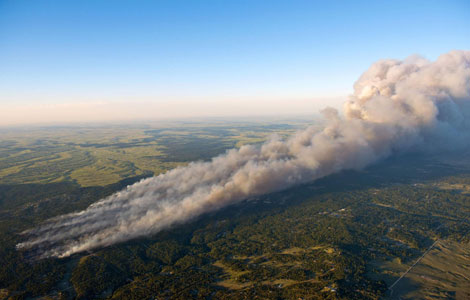
ISLAMABAD - Pakistanis began voting on Saturday morning in a one-day general election to elect a new government for the next five years with hopes of a positive change and end to the years of terrorism in the country.
The polling started at 8:00 am local time in the morning and will continue uninterrupted up to 5:00 pm local time in the afternoon.
This is the first time in Pakistan's 65-year history that transfer of power to next elected government would take place upon the completion of the tenure of a democratically elected government.
The parties that have ruled Pakistan for the past five years are facing a significant challenge from arch political rivals, said local analysts.
There are over 86.1 million registered voters in the country, including over 48.6 million male and 37.5 million female voters, according to the Election Commission of Pakistan (ECP).
Out of the 342 National Assembly seats, 272 seats are open for contesting. However, due to the death of candidates and poor law and order situation, elections will only take place in 268 constituencies across the country.
Election on special seats for women and minorities will be determined later on the basis of seats the parties will get in general elections.
Polling for the four provincial assembly seats is also being held in the country on Saturday. Out of the 728 provincial assembly seats, 572 seats are open for voters with the remaining seats to be decided according to the share of the seats won by the competing parties in the elections.
Security will remain the biggest challenge for the elections in view of possible attacks by Pakistan Taliban.
A military spokesman said more than 75,000 troops have already been deployed across the country to assist the civil administration for the general elections.
Over 100 people, including three candidates, have reportedly been killed and some 300 others were injured in bomb attacks and firing during the 20-day campaign.
Taliban claimed responsibility for most of these attacks and has warned more attacks on the Election Day.
Federal Information Minister Arif Nizami said that the Taliban threats could affect the voter turn-out. However, political analysts believe that the youths' participation in the election campaign is likely to give a boost to the turnout rate.
Chief Election Commissioner Fakhruddin G. Ebrahim has called upon the people to exercise their voting right without any fear in elections.
Several dozens of political and religious parties in the country are taking part in Saturday's elections. However, the major contest will take place among the three parties, namely Pakistan Peoples Party (PPP) of President Asif Ali Zardari, Pakistan Muslim League-Nawaz (PML-N) led by former Prime Minister Nawaz Sharif and Pakistan Tehrik-e-Insaf (PTI) or Justice Movement of cricketer-turned politician Imran Khan.







